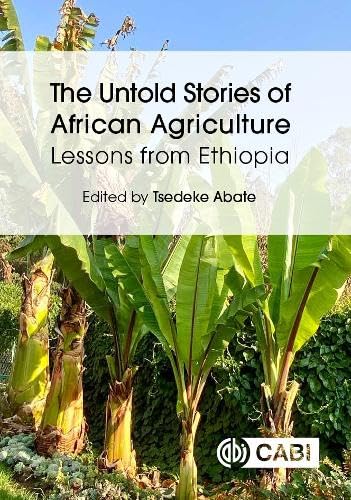

A new approach to African agriculture: Lessons from Ethiopia
On 5 October 2024, a new book 'The Untold Stories of African Agriculture: Lessons from Ethiopia' was launched at the International Livestock Research Institute (ILRI) in Ethiopia. Authored by renowned agricultural expert Tsedeke Abate, the book gives an in-depth exploration of Ethiopia's agricultural sector and offers vital lessons that could reshape agriculture across Africa. These are timely insights as challenges such as food security, climate change, and economic development grow increasingly pressing.

Ethiopia’s agricultural sector exemplifies the transformative potential of focused investments and policies. Over recent decades, the country has made remarkable strides in improving agricultural productivity. Government-led initiatives have led to advancements in farming techniques, broadened access to essential inputs like fertilizer and seed, and expanded irrigation systems, all of which have helped increase food production. Yet Ethiopia’s agriculture sector still faces persistent challenges. Food insecurity remains particularly a challenge in rural areas, and the sector's export earnings fluctuate with global market dynamics. Additionally, infrastructure and technology limitations continue to inhibit its full potential.
‘Rather than merely identifying the obstacles facing African agriculture, this book emphasizes practical solutions informed by Ethiopia’s journey. The Untold Stories of African Agriculture offers examples rooted in real-life successes and challenges for African leaders, policymakers, researchers, and agricultural practitioners,’ says Abate.
By examining Ethiopia’s successes and setbacks, the book illustrates the importance of learning from these experiences to tackle similar issues across the continent. It also provides a framework for addressing food security challenges, reducing import dependency and enhancing export earnings.
Food security is one of the book’s central themes, a concern shared across the continent. Ethiopia has experienced multiple famines and periods of food shortage over the years. The book analyzes the key factors that contribute to food insecurity and proposing solutions that other African countries could adopt.
The book emphasizes the benefits of modern agricultural practices, such as adopting advanced farming techniques, improving irrigation infrastructure, and ensuring access to quality inputs like seed and fertilizer. It advocates for policies that empower smallholder farmers, who form the backbone of the agricultural workforce in both Ethiopia and many African countries. Providing these farmers with necessary tools and resources could significantly enhance food production and lessen dependency on imported food.
It also discusses the role of agricultural exports as a driver of economic growth. Agriculture is a primary economic pillar in many African countries, offering employment to millions and generating critical export revenue. But Africa’s agricultural exports often face challenges due to infrastructure gaps, inconsistent quality, and global market instability. The book shares Ethiopia’s experience in diversifying its agricultural exports to include livestock, grains, and other products, which has helped mitigate the economic impacts of market volatility.
For African nations seeking to expand their agricultural exports, Ethiopia’s approach underscores the importance of investing in infrastructure, enhancing product quality, and diversifying export portfolios. Such efforts could improve African countries’ global competitiveness, providing a foundation for economic growth.
At the book’s launch, ILRI’s Namukolo Covic, said The Untold Stories of African Agriculture is more than a collection of insights.
‘It is a catalyst for action because addressing Africa’s agricultural challenges requires a multi-faceted approach that includes improving food security, bolstering climate resilience, and stimulating economic growth. I envisions the book sparking a continent-wide dialogue on the future of African agriculture, inspiring African nations to learn from one another, exchange best practices, and foster collaboration,’ she said.
Furthermore, when African stories are told by Africans, it fosters a stronger sense of ownership and pride in the continent’s journey. This ownership is crucial for inspiring new generations of African leaders, researchers, and farmers, who see their contexts and identities reflected in these narratives.
‘African cannot, and should not, outsource its development agenda to the outside world. By taking ownership of its development agenda, Africa can shape a future that is equitable, sustainable, and deeply reflective of its diverse cultures and aspirations. The journey is not about rejecting support but about ensuring it complements, rather than dictates, Africa's path to prosperity,’ said Abate.




